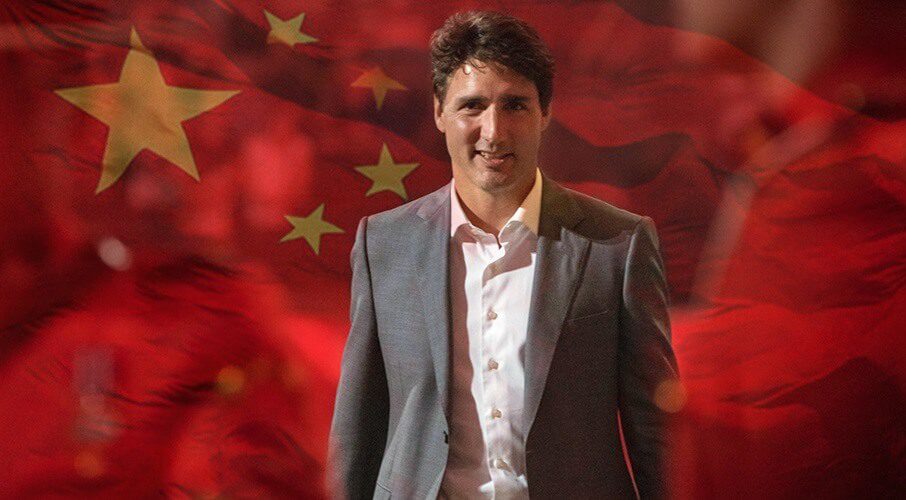 Our government’s increasingly pointed rhetoric with no substantive followup only confirms the weakness of Canada’s position with China, while Ottawa’s attempts at clever diplomacy in trying to steer a middle path between the PRC and the U.S. has only debased Washington’s faith in Canada’s commitment to the integrity of the international rules-based order, writes Charles Burton.
Our government’s increasingly pointed rhetoric with no substantive followup only confirms the weakness of Canada’s position with China, while Ottawa’s attempts at clever diplomacy in trying to steer a middle path between the PRC and the U.S. has only debased Washington’s faith in Canada’s commitment to the integrity of the international rules-based order, writes Charles Burton.
By Charles Burton, July 22, 2021
The White House has confirmed that U.S. President Joe Biden plans to meet later this year with his Japanese, Australian and Indian counterparts — a four-country grouping dubbed the “Quadrilateral Security Dialogue” or QUAD.
The announcement came just days after Chinese Communist Party General-Secretary Xi Jinping marked the centenary of the party with an incendiary oratory that was short on Marxism but long on nationalist promises “to build a new type of international relations.”
This is Xi’s doctrine of “the community of the common destiny of mankind” under future People’s Republic of China (PRC) global domination, which includes making irrelevant the current institutions that promote peace, prosperity and justice, such as the United Nations, World Trade Organization, G-20 and G-7.
The latter’s get-together earlier this summer in Cornwall, England was dismissed by China’s U.K. embassy, saying “the days when global decisions were dictated by a small group of countries are long gone.”
Xi himself made clear China “will not accept sanctimonious preaching from those who feel they have the right to lecture us,” and such opponents of the PRC’s policies of genocide and hostage diplomacy will “have their heads bashed bloody.” The latter colourful phrase was edited out of the official English-language translation of the speech, but was enthusiastically cited in jingoist Chinese social media.
There is an urgent need for Ottawa to fund programs that train young Canadians in contemporary Communist China studies, including Mandarin language studies. Chinese propagandists blatantly distort official statements through shameless mistranslation and subtle edits for foreign audiences.
The PRC’s engagement of Canada employs agents fluent in English or French, so how can we expect to accurately comprehend the situation when our people mostly can barely read or understand Chinese and rely largely on translations provided by Chinese authorities?
Since the 2018 arrest of Huawei CFO Meng Wanzhou and China’s retaliatory detention of Michael Kovrig and Michael Spavor — combined with Beijing’s coercive cancellation of Canadian agricultural contracts, and revelations of China’s program of genocide against Uyghur Muslims — Canadian public support has plunged below 20 per cent for Ottawa’s strategy of quiet diplomacy and a lack of resetting its China policy.
However, the need to counter “anti-Asian hate” in Canada is being misconstrued by Canadian commentators with agendas, people who argue against Canadians raising such concerns as Beijing’s reluctance to disclose data for an international investigation of the origins of COVID-19, or demanding China give the UN Human Rights High Commissioner unconditional access to travel in Uyghur regions to get the truth about their situation.
Some of these pundits promote an appalling implication that Chinese Canadians are somehow connected with the malign policies of the Chinese Communist Party.
So while Biden demands that Western powers need to act now to counter a resurgent China, he evidently does not have Canada with him. Canada’s hesitancy in confronting the PRC is partly assisted by influential people in Ottawa who enjoy lucrative board memberships, or associations with law firms, or well-connected Canadian businesses that have close ties with PRC state business.
China has established an environment where Canadian policy-makers are subject to promises of personal benefit in return for not inhibiting PRC interests in Canada. Canadians are right to demand transparency on the nature of such ties to a hostile foreign power, and full disclosure of financial or other rewards thus generated.
Unfortunately, as Canadians anticipate a fall election, Conservative MP Kenny Chiu’s private member’s Bill C-282 — “An Act to establish the Foreign Influence Registry,” described by him as intended “to recognize and increase vigilance to shine a light on harmful interference from abroad” — will likely not get any further than its first reading back in April.
Our government’s increasingly pointed rhetoric with no substantive followup only confirms the weakness of Canada’s position with China, while Ottawa’s attempts at clever diplomacy in trying to steer a middle path between the PRC and the U.S. has only debased Washington’s faith in Canada’s commitment to the integrity of the international rules-based order.
Prime Minister Justin Trudeau needs to phone President Biden to assure him of Canada’s support for positive determinations that come out of the QUAD meeting. Then we should not just talk the talk but stand up and show some courage of our convictions.
Charles Burton is a senior fellow at the Macdonald-Laurier Institute and non-resident senior fellow of the European Values Center for Security Policy in Prague. He is a former professor of political science at Brock University and has served as a diplomat at Canada’s embassy in Beijing.




